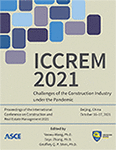The Characteristics of Construction Disputes: Transaction Cost Economics Perspective
Publication: ICCREM 2021
ABSTRACT
It is broadly acknowledged that contracts play an important role in the architecture, engineering, and construction industry. It is also widely acknowledged that construction disputes are gradually becoming an epidemic. Facing the increased construction disputes, practitioners are struggling to find ways to equitably and economically resolve them. In addition, much of the related research on disputes are discussed. According to Williamson’s framework of Transaction Cost Economics (TCE), disputes in construction may be inevitable. Hence, how to properly resolve these disputes is very important for all participants involved in construction projects. Under the framework of TCE, the “transaction” is the basis of analysis, and this feature makes TCE a very useful contact with many of the issues of central interest to applied microeconomics. This research aims at finding out the construction dispute characteristics (CDCs) in line with asset specificity, uncertainty, and frequency, which are identified by Williamson as principal dimensions with respect to differing or various transactions. These characteristics are considered beneficial to the construction industry, as they could provide construction professionals with a systematic approach in selecting the proper dispute resolution technique.
Get full access to this article
View all available purchase options and get full access to this chapter.
REFERENCES
Arditi, D., and Pulket, T. (2010). “Predicting the outcome of construction litigation: using an integrated artificial intelligence model.” Journal of Computing in Civil Engineering, 24(1), 73–80.
Arditi, D., and Tokdemir, O. B. (1999a). “Using case-based reasoning to predict the outcome of construction litigation.” Computer-Aided Civil and Infrastructure Engineering, 14(6), 385–393.
Arditi, D., and Tokdemir, O. B. (1999b). “Comparison of cased-based reasoning and artificial neural networks.” Journal of Computing in Civil Engineering, 13(3), 162–169.
Bercovitch, J., and Langley, J. (1993). “The Nature of the dispute and effectiveness of international mediation.” Journal of Conflict Resolution, 37(4), 670–691.
Chang, C. Y., and Ive, G. (2007). “The hold-up problem in the management of construction project: a case study of channel tunnel.” International Journal of Project Management, 25(4), 394–404.
Chappell, D., Smith, V. P., and Sims, J. (2005). Building contract claims. Blackwell Publishing Ltd., UK.
Chen, J. H., and Hsu, S. C. (2007). “Hybrid ANN-CBR model for disputed change orders in construction projects.” Automation in Construction, 17, 56–64.
Cheung, S. O. (1999). “Critical factors affecting the use of alternative dispute resolution processes in construction.” International Journal of Project Management, 17(3), 189–194.
Cheung, S. O., and Suen, C. H. (2002). “A multi-attribute utility model for dispute resolution strategy selection.” Construction Management and Economics, 20(7), 557–568.
Gebken, R. J., and Gibson, G. E. (2006). “Quantification of cost for dispute Resolution procedures in the construction industry.” Journal of Professional Issues in Engineering Education and Practice, 132(3), 264–271.
Heide, J. B., and Miner, A. S. (1992). “The shadow of the future: effects of anticipated interaction and frequency of contract on buyer-seller cooperation.” Academy of Management Journal, 35(2), 265–291.
Ibbs, W., Nguyen, L. D., and Lee, S. (2007). “Quantified impacts of project changes.” Journal of Professional Issues in Engineering Education and Practice, 133(1), 45–52.
Jin, X. H., and Doloi, H. (2008). “Interpreting risk allocation mechanism in public-private partnership projects: an empirical study in transaction cost economics perspective.” Construction Management and Economics, 26(7), 707–721.
Koopmans, T. (1957). Three essays on the state of economic science. McGraw-Hill, New York.
Masten, S. E., Meehan, J. M., and Snyder, E. A. (1991). “The cost of organization.” Journal of Law, Economics and Organization, 7, 1–25.
McEwen, C. A., and Maiman, R. J. (1986). “The relative significance of dispute forum and dispute characteristics for outcome and compliance.” Law and Society Review, 20(3), 439–447.
Milgrom, P., and Roberts, J. (1992). Economics, organization and management, Prentice Hall, New Jersey.
Ndekugri, I., and Mcdonnell, B. (1999). “Differing site conditions risks: a FIDIC/engineering and construction contract comparison.” Engineering, Construction and Architectural Management, 6(2), 177–187.
Ramsey, V., Minogue, A., Baster, J., O’Reolly, M., and Lal, H. (2009). Construction Law Handbook, Thomas Telford Publishing, London.
Shin, K. C., and Molenaar, K. (2000). “Prediction of construction disputes in change issues.” Proceedings of Construction Congress VI: Building Together for a Better Tomorrow in an Increasingly Complex World, Orlando, U.S., 534–544.
CIOB (The Chartered Institute of Building). (2002). Code of practice for project management for construction and development, Blackwell Publishing Ltd, Oxford.
SCL (The Society of Construction Law). (2002). The delay and disruption protocol, The Society of Construction Law, Leicestershire.
Vidmar, N. (1984). “The small claims court: a reconceptualization of disputes and an empirical investigation.” Law and Society Review, 18(4),515–550.
Vidmar, N. (1987). “Assessing the effects of case characteristics and settlement forum on dispute outcomes and compliance.” Law and Society Review, 21(1), 155–164.
Williamson, O. E. (1975). Markets and hierarchies: analysis and antitrust implications, Macmillan Publishing, London.
Williamson, O. E. (1979). “Transaction-Cost economics: the governance of contractual relations.” Journal of Law and Economics, 22(2), 233–261.
Williamson, O. E. (1985). The economic institutions of capitalism: firms, markets, relational contracting, The Free Press, New York.
Winch, G. M. (2001). “Governing the project process: a conceptual framework.” Construction Management and Economics, 19(8), 799–808.
Yates, D. J. (1998). “Conflict and disputes in the development process: a transaction cost economics perspective.” <www.prres.net/proceedings/proceedings1998/Papers/Yates3Ai.PDF>.
Zaghloul, R., and Hartman, F. (2003). “Construction contracts: the cost of mistrust.” International Journal of Project Management, 21(6), 419–424.
Information & Authors
Information
Published In
Copyright
© 2021 American Society of Civil Engineers.
History
Published online: Dec 9, 2021
Authors
Metrics & Citations
Metrics
Citations
Download citation
If you have the appropriate software installed, you can download article citation data to the citation manager of your choice. Simply select your manager software from the list below and click Download.
